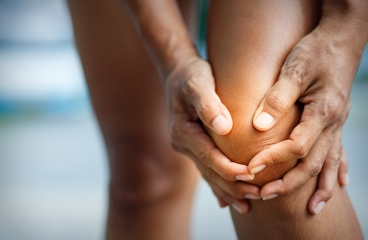Knee Pain or Injury: Care Instructions
Overview

Injuries are a common cause of knee problems. Sudden (acute) injuries may be caused by a direct blow to the
knee. They can also be caused by abnormal twisting, bending, or falling on the knee. Pain, bruising, or
swelling may be severe, and may start within minutes of the injury.
Overuse is another cause of knee pain. Other causes are climbing stairs, kneeling, and other activities that
use the knee. Everyday wear and tear, especially as you get older, also can cause knee pain.
Rest, along with home treatment, often relieves pain and allows your knee to heal. If you have a serious knee
injury, you may need tests and treatment.
Follow-up care is a key part of your treatment and safety. Be sure to make and go to all
appointments, and call your doctor if you are having problems. It's also a good idea to know your test results
and keep a list of the medicines you take.
How can you care for yourself at home?
-
Be safe with medicines. Read and follow all instructions on the label.
-
If the doctor gave you a prescription medicine for pain, take it as prescribed.
-
If you are not taking a prescription pain medicine, ask your doctor if you can take an
over-the-counter medicine.
-
Rest and protect your knee. Take a break from any activity that may cause pain.
-
Put ice or a cold pack on your knee for 10 to 20 minutes at a time. Put a thin cloth between the ice and
your skin.
-
Prop up a sore knee on a pillow when you ice it or anytime you sit or lie down for the next 3 days. Try to
keep it above the level of your heart. This will help reduce swelling.
-
If your knee is not swollen, you can put moist heat, a heating pad, or a warm cloth on your knee.
-
If your doctor recommends an elastic bandage, sleeve, or other type of support for your knee, wear it as
directed.
-
Follow your doctor's instructions about how much weight you can put on your leg. Use a cane, crutches, or
a walker as instructed.
-
Follow your doctor's instructions about activity during your healing process. If you can do mild exercise,
slowly increase your activity.
-
Stay at a healthy weight. Extra weight can strain the joints, especially the knees and hips, and make the
pain worse. Losing a few pounds may help.
When should you call for help?
 Call 911
anytime you think you may need emergency care. For example, call if:
Call 911
anytime you think you may need emergency care. For example, call if:
Call your doctor now or seek immediate medical care if:
Watch closely for changes in your health, and be sure to contact your doctor if:
Current as of: July 17, 2023
Content Version: 14.0
Care instructions adapted under license by your
healthcare professional. If you have questions about a medical condition or this instruction, always ask
your healthcare professional. Healthwise, Incorporated disclaims any warranty or liability for your use of
this information.